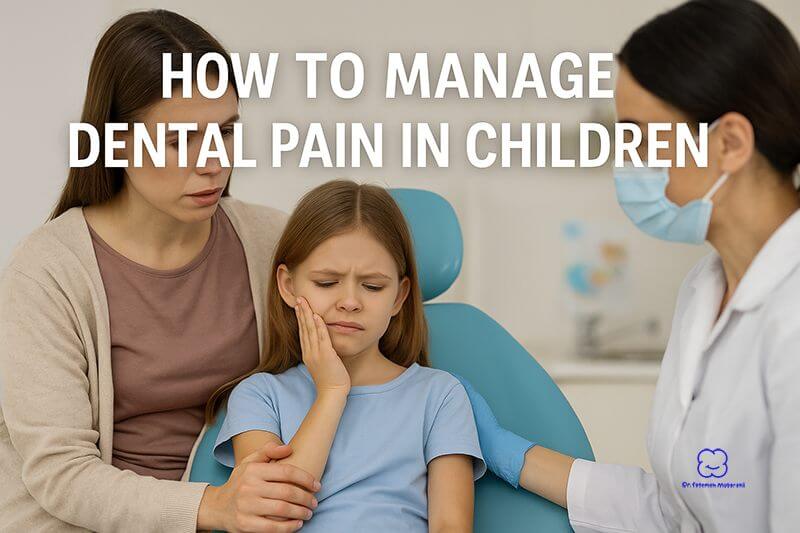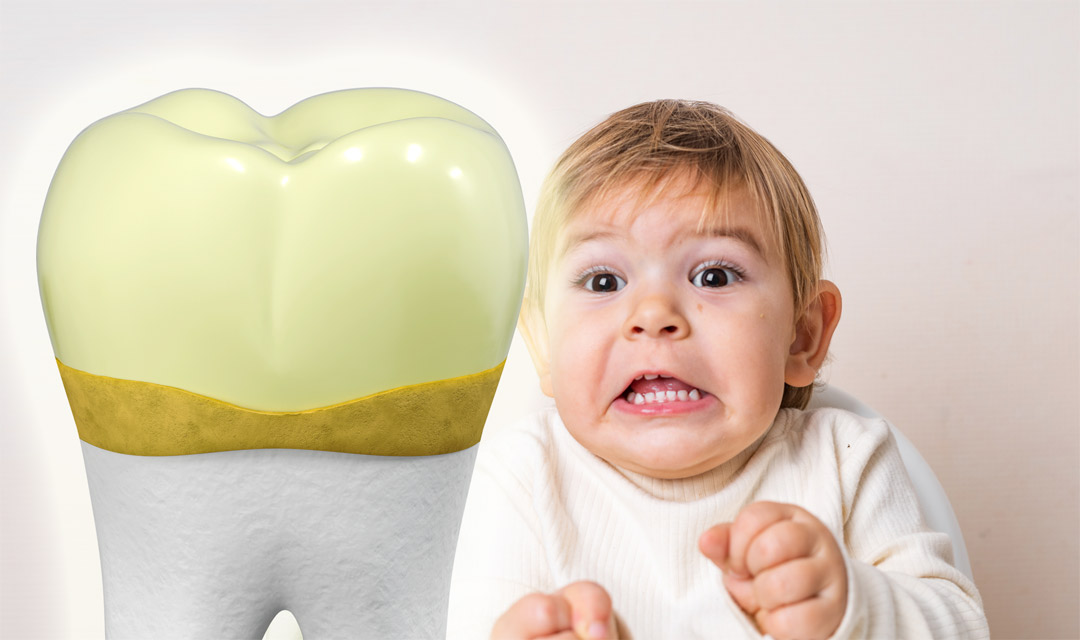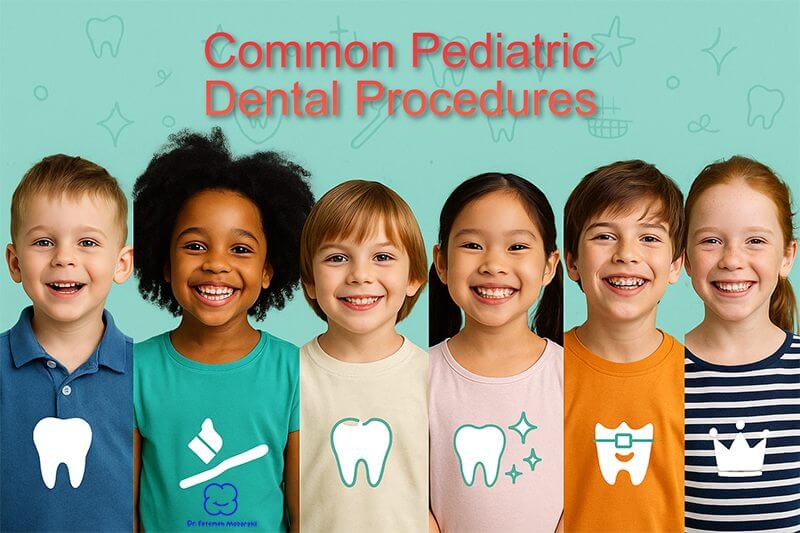Tooth sensitivity is a common issue that affects not only adults but also children. This condition, often referred to as tooth sensitivity, can cause discomfort or pain when eating, drinking, or brushing, which may significantly impact a child’s quality of life. As a pediatric dentist in Dubai, I frequently encounter cases of tooth sensitivity in children and understand the importance of addressing this problem effectively. This article will explore the causes, prevention, and treatment of tooth sensitivity in kids, along with expert insights.
What is Tooth Sensitivity?
Tooth sensitivity, also known as dentin hypersensitivity, occurs when the enamel that protects the teeth becomes worn or the gums recede, exposing the sensitive inner layers of the teeth. These layers contain tiny tubules that lead to the nerves of the tooth. When exposed to external stimuli such as hot or cold foods, sweet or acidic substances, or even air, these nerves can cause a sharp, sudden pain.
In children, this condition can be particularly troublesome, as they may not fully understand why they are experiencing discomfort or how to communicate it to their parents. It is essential for parents to be aware of the signs and symptoms of tooth sensitivity in their children so they can seek timely help.
Causes of Tooth Sensitivity in Kids
Understanding the underlying causes of tooth sensitivity in children is key to preventing and treating this condition. Below are some common reasons why kids may experience sensitive teeth:
1. Tooth Decay
Tooth decay is a leading cause of tooth sensitivity in children. Cavities expose the inner layers of the teeth, making them more vulnerable to external stimuli. When the enamel is compromised due to decay, the dentin becomes exposed, leading to heightened sensitivity.
2. Enamel Erosion
Excessive consumption of acidic foods and drinks, such as soda, citrus fruits, and candy, can erode the enamel over time. Weak enamel exposes the underlying dentin, leading to tooth sensitivity. Children are often drawn to sugary and acidic snacks, which makes them particularly prone to enamel erosion.
3. Brushing Habits
Using a hard-bristled toothbrush or applying too much pressure while brushing can wear down the enamel or irritate the gums, contributing to tooth sensitivity. Many children may not have developed proper brushing techniques, and parents should supervise to ensure they are using gentle strokes and a soft-bristled toothbrush.
4. Teeth Grinding (Bruxism)
Some children grind their teeth, especially during sleep. This habit can wear down the enamel and make teeth more sensitive. Bruxism can be caused by stress, anxiety, or even misaligned teeth, and it often goes unnoticed until symptoms like tooth sensitivity appear.
5. Dental Procedures
Recent dental treatments, such as fillings, crowns, or braces, may temporarily increase tooth sensitivity in children. The dental work can irritate the nerve endings within the teeth, leading to temporary discomfort, especially when exposed to hot or cold stimuli.
6. Gum Recession
Although less common in kids, gum recession can occur due to gum disease or aggressive brushing, exposing the tooth roots and causing tooth sensitivity. Receding gums can expose areas of the teeth that are not protected by enamel, resulting in increased sensitivity.
7. Emerging Teeth
When new teeth erupt, children may experience temporary tooth sensitivity due to the pressure and exposure of dentin. This is particularly common during the teething phase, when both baby teeth and permanent teeth are coming in.
Symptoms of Tooth Sensitivity in Kids
Recognizing the signs of tooth sensitivity in children is crucial for timely intervention. Common symptoms include:
- Complaints of pain or discomfort when eating hot, cold, sweet, or acidic foods.
- Reluctance to brush teeth or use mouthwash.
- Unexplained irritability or discomfort during meals.
- Frequent touching of the mouth or wincing while eating.
It is important to note that children may not always be able to articulate what they are feeling, so observing their behavior is key. If your child is avoiding certain foods or seems uncomfortable while eating, it could be a sign of tooth sensitivity.
How to Prevent Tooth Sensitivity in Kids
Prevention is always better than cure. Here are some tips to help protect your child’s teeth from tooth sensitivity:
1. Encourage Proper Oral Hygiene
Teach your child to brush their teeth gently with a soft-bristled toothbrush and fluoride toothpaste. Regular flossing can also help prevent gum issues. Supervision during brushing is recommended for younger children to ensure they are using proper techniques without applying too much pressure.
2. Limit Sugary and Acidic Foods
Reduce your child’s intake of sugary and acidic foods and beverages that can erode enamel. Offer water, milk, and tooth-friendly snacks like cheese and vegetables instead. Encouraging healthy eating habits not only benefits overall health but also helps maintain strong teeth and reduce the risk of tooth sensitivity.
3. Regular Dental Check-Ups
Visit a pediatric dentist in Dubai regularly for professional cleanings and to monitor your child’s oral health. Early detection of potential issues can prevent tooth sensitivity from developing. Routine dental check-ups are essential for identifying problems like cavities, enamel erosion, or gum issues before they become more serious.
4. Use Fluoride Treatments
Fluoride strengthens tooth enamel and protects against cavities. Your pediatric dentist may recommend fluoride varnishes or gels during routine check-ups. Fluoride treatments are especially beneficial for children at higher risk of developing tooth decay or tooth sensitivity.
5. Provide a Mouthguard
If your child grinds their teeth, a custom-made mouthguard can protect the enamel and prevent tooth sensitivity. Mouthguards are particularly helpful for children who grind their teeth during sleep or participate in contact sports that could cause dental trauma.
6. Teach Gentle Brushing Techniques
Educate your child on the importance of gentle brushing. Using a soft-bristled toothbrush and avoiding aggressive scrubbing can protect both enamel and gums from damage that can lead to tooth sensitivity.
7. Hydrate with Water
Encourage your child to drink water throughout the day. Water helps wash away acids and food particles that can erode enamel. Drinking water after meals can also help neutralize acids and reduce the risk of tooth sensitivity.
Treatment Options for Tooth Sensitivity in Kids
When tooth sensitivity becomes an issue, there are several effective treatments available:
1. Desensitizing Toothpaste
Switching to a toothpaste formulated for sensitive teeth can help reduce discomfort over time. These products work by blocking the exposed tubules in the dentin. Using desensitizing toothpaste regularly can gradually build up a protective layer on the teeth.
2. Fluoride Applications
Professional fluoride treatments can strengthen enamel and reduce tooth sensitivity. These treatments are quick and non-invasive, making them suitable for children. Fluoride applications can be done in the dental office during routine check-ups and are an effective way to reduce sensitivity.
3. Dental Sealants
Sealants provide a protective barrier over the teeth, preventing enamel erosion and reducing tooth sensitivity. Dental sealants are particularly useful for children who are prone to cavities, as they help protect the chewing surfaces of the back teeth.
4. Restorative Procedures
If tooth sensitivity is caused by cavities or enamel loss, restorative treatments like fillings or crowns may be necessary. Restorative procedures help repair damaged areas of the teeth and protect them from further exposure and sensitivity.
5. Gum Treatments
For tooth sensitivity caused by gum issues, treatments to restore gum health or cover exposed roots may be recommended. In some cases, a gum graft may be necessary to cover exposed areas and reduce sensitivity.
6. Nightguards for Bruxism
If teeth grinding in children is the cause of tooth sensitivity, your dentist may recommend a nightguard. A nightguard can prevent further enamel wear and reduce sensitivity caused by grinding.
“Tooth sensitivity in children is a treatable condition that should never be ignored. Parents play a crucial role in maintaining their child’s oral health by encouraging proper brushing habits, reducing sugary foods, and scheduling regular dental visits. Early intervention by a pediatric dentist can prevent small issues from turning into major problems.”
– Dr. Fatemeh Mobaraki, Pediatric Dentist in Dubai
When to See a Pediatric Dentist
If your child frequently complains of tooth pain or shows reluctance to eat or brush their teeth, it’s essential to consult a dentist. A professional evaluation can determine the root cause of the tooth sensitivity and recommend the best course of action. Tooth sensitivity can sometimes indicate more serious underlying issues, such as cavities or gum disease, which require prompt treatment.
Parents should also seek dental advice if their child has undergone recent dental procedures and continues to experience prolonged sensitivity. In many cases, early intervention can help alleviate discomfort and prevent further complications.
Tips for Managing Tooth Sensitivity at Home
While professional treatment is often necessary, there are some steps parents can take at home to help manage their child’s tooth sensitivity:
1. Avoid Extreme Temperatures
Avoid giving your child foods and drinks that are extremely hot or cold. Lukewarm temperatures are less likely to trigger tooth sensitivity and can help minimize discomfort.
2. Soft-Bristled Toothbrush
Ensure your child is using a soft-bristled toothbrush to prevent further enamel erosion. Hard bristles can be too abrasive and contribute to increased tooth sensitivity over time.
3. Rinse with Salt Water
Rinsing with salt water can help soothe irritated gums and reduce tooth sensitivity. Mix half a teaspoon of salt in a cup of warm water and have your child rinse gently.
4. Monitor Diet
Keep an eye on your child’s diet and limit acidic or sugary foods that can contribute to enamel erosion. Encourage a balanced diet rich in calcium and other nutrients that promote strong teeth and help prevent tooth sensitivity.
5. Use Desensitizing Toothpaste
Desensitizing toothpaste can be used at home to help reduce tooth sensitivity over time. Encourage your child to brush with it twice a day for the best results.
Final Thoughts
Tooth sensitivity in kids can be distressing for both parents and children. By understanding the causes, recognizing the symptoms, and taking preventive measures, you can protect your child’s teeth and ensure their comfort. Regular visits to a trusted pediatric dentist in Dubai will provide your child with the care and guidance they need to maintain a healthy smile.
If you have concerns about your child’s tooth sensitivity, don’t hesitate to book an appointment. Early intervention can make all the difference in your child’s oral health journey. Remember, maintaining good oral hygiene, a healthy diet, and regular dental visits are the keys to preventing tooth sensitivity and ensuring a bright, pain-free smile for your child.
Frequently Asked Questions (FAQs)
What causes tooth sensitivity in children?
Tooth sensitivity in children can be caused by tooth decay, enamel erosion, aggressive brushing, teeth grinding, or recent dental procedures.
How can I help my child with sensitive teeth at home?
Use a soft-bristled toothbrush, switch to desensitizing toothpaste, and avoid hot or cold foods. If sensitivity persists, consult a pediatric dentist.
When should I take my child to the dentist for tooth sensitivity?
If your child complains of tooth pain, avoids foods, or shows reluctance to brush, consult a pediatric dentist.








